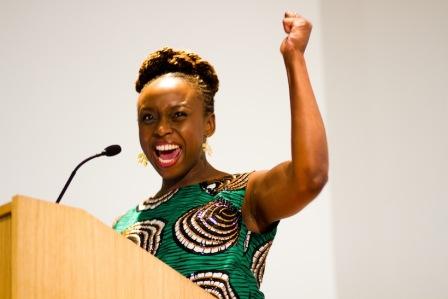In an open letter to US President Joe Biden, famed writer, Chimamanda Ngozi Adichie says “rage is brewing” in Nigeria.
Adichie, in the letter published by The Atlantic, said this rage is especially felt by young people who exercised their franchise in the February 25 presidential election but were disappointed by the Independent National Electoral Commission (INEC).
“The discontent, the despair, the tension in the air have not been this palpable in years,” she said.
In previous elections, she noted, many Nigerians stayed away from voting because they had little confidence in the electoral system.
“To vote in a presidential election was to brace yourself for the inevitable aftermath: fraud,” the writer said.
Read Also: Buhari sacks Saratu Umar as NIPC boss
Adichie explained that “cautious trust” in the system was rekindled ahead of the 2023 polls with the signing of the Electoral Act 2022 and INEC Chairman, Prof Mahmood Yakubu’s assurance that “votes would be counted in the presence of voters and recorded in a result sheet, and that a photo of the signed sheet would immediately be uploaded to a secure server”.
She said, “Nigerians applauded him. If results were uploaded right after voting was concluded, then the ruling party, the All Progressives Congress (APC), which has been in power since 2015, would have no opportunity for manipulation. Technology would redeem Nigerian democracy. Results would no longer feature more votes than voters. Nigerians would no longer have their leaders chosen for them. Elections would, finally, capture the true voice of the people. And so trust and hope were born.”
She stated that the trust dissipated by the evening of February 25 when Nigerians observed that INEC workers reported late or without basic materials at many polling units, there was widespread violence and snatching of ballot boxes and massive voter suppression.
“Most egregious of all, the electoral commission reneged on its assurance to Nigerians. The presidential results were not uploaded in real time. Voters, understandably suspicious, reacted; videos from polling stations show voters shouting that results be uploaded right away. Many took cellphone photos of the result sheets. Curiously, many polling units were able to upload the results of the House and Senate elections, but not the presidential election,” Adichie said.
According to her, “No one was surprised when, by the morning of the 26th, social media became flooded with evidence of irregularities. Result sheets were now slowly being uploaded on the INEC portal, and could be viewed by the public. Voters compared their cellphone photos with the uploaded photos and saw alterations: numbers crossed out and rewritten; some originally written in black ink had been rewritten in blue, some blunderingly whited-out with Tipp-Ex. The election had been not only rigged, but done in such a shoddy, shabby manner that it insulted the intelligence of Nigerians.”
She said that many appeals from stakeholders and ordinary Nigerians to the INEC Chairman, Prof Mahmood Yakubu, to pause results announcement for allegations of irregularities to be investigated were rebuffed.
Adichie said the announcement of Asiwaju Bola Tinubu as President-elect was celebrated by “few people”.
“It seemed truly perplexing that, in the context of a closely contested election in a low-trust society, the electoral commission would ignore so many glaring red flags in its rush to announce a winner. (It had the power to pause vote counting, to investigate irregularities—as it would do in the governorship elections two weeks later.)” Adichie said.
The writer said it was “surprising then to see the U.S. State Department congratulate Tinubu on March 1”.
Quoting an excerpt from the congratulatory message, Adichie said “American intelligence surely cannot be so inept. A little homework and they would know what is manifestly obvious to me and so many others: The process was imperiled not by technical shortcomings but by deliberate manipulation.”
She also faulted the popular American newspaper, Washington Post for echoing the State Department in an editorial.
“In an oddly infantilizing tone, as though intended to mollify the simpleminded, we are told that “officials have asserted that technical glitches, not sabotage, were the issue,” that “much good” came from the Nigerian elections, which are worth celebrating because, among other things, “no one has blocked highways, as happened in Brazil after Jair Bolsonaro lost his reelection bid.” We are also told that “it is encouraging, first, that the losing candidates are pursuing their claims through the courts,” though any casual observer of Nigerian politics would know that courts are the usual recourse after any election.
“The editorial has the imaginative poverty so characteristic of international coverage of African issues—no reading of the country’s mood, no nuance or texture. But its intellectual laziness, unusual in such a rigorous newspaper, is astonishing. Since when does a respected paper unequivocally ascribe to benign malfunction something that may very well be malignant—just because government officials say so? There is a kind of cordial condescension in both the State Department’s and The Washington Post’s responses to the election. That the bar for what is acceptable has been so lowered can only be read as contempt,” she said.
Adichie urged the US President not to share “this cordial condescension”.
“You have spoken of the importance of a “global community for democracy,” and the need to stand up for “justice and the rule of law.” A global community for democracy cannot thrive in the face of apathy from its most powerful member. Why would the United States, which prioritizes the rule of law, endorse a president-elect who has emerged from an unlawful process?” she asked.

